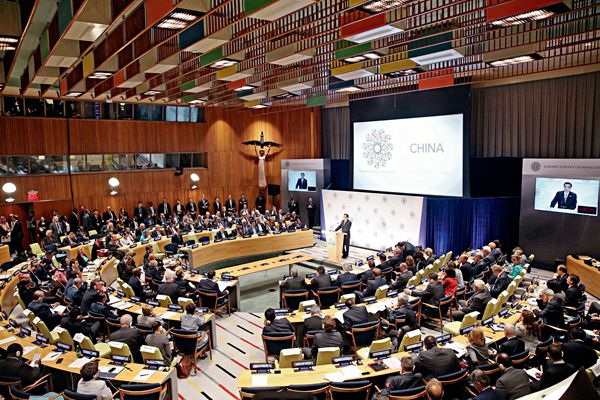2016: A Fruitful Year for Chinese Diplomacy
China Today by WU SIKE, January 22, 2017 Adjust font size:
THE international situation in 2016 saw an array of major, complicated, and profound transformations. Complex geopolitical factors combined with conflicts, turmoil, and regional hot-spot and global challenges, notably the refugee crisis and terrorism. The global ideological ethos also entered a proactive phase that year, and the protracted recovery of the world economy, sluggish international trade and investment, and rising protectionism complicated the development of emerging market economies. The evolutionary trend, however, implies that the international order is heading steadily towards peace and development. A new round of technological and industrial revolution has engendered stronger ties among various countries of the world, so linking human destiny more closely than ever before.
Promote Transformation of Global Governance
China’s diplomacy in 2016 prompted extensive and far-reaching proposals and schemes in the areas of global politics, economy, and security. China has become a leading force in the evolution of international relations. The country has contributed its native wisdom to and played an integral role in safeguarding world peace and facilitating global development. More countries now acknowledge China’s comprehensively deepened innovation of diplomatic theory with win-win cooperation at the core of international relations, and its concept of building a world community of common destiny is gradually gaining greater global acceptance. China advocates the establishment of an equal, peaceful, and inclusive partnership that upholds justice and collaboratively builds a security framework; one that advances towards open, innovative and mutually beneficial development and strives to promote exchanges between different civilizations and respect for a natural and green ecosystem. China’s diplomacy is guided by these significant concepts.
The successful convening of the G20 Summit in China’s Hangzhou in September 2016 showcased the combination of Chinese wisdom and global governance, and also the actual practice of China’s philosophy of global governance. Chinese President Xi Jinping gave an overall explanation of China’s insight into global economic governance wherein equality is its foundation, openness its orientation, cooperation its driving force, and sharing is its goal. A fair and efficient pattern of global financial governance: an open and transparent mode of regulating global trade and investment, green, low-carbon global energy controls, and inclusive and interlinked governance of global development may thus be jointly implemented. The summit blazed new trails and expanded world economic borders, built new mechanisms and achieved a consensus on international cooperation, promoting greater openness and integration of the global economy. It consequently constitutes a milestone in the history of the G20’s development.
More Cooperation with Developing Countries
A country should take morality rather than profit as its main interest. Since the 18th National Congress of the Communist Party of China (CPC) in 2012, the CPC Central Committee, with General Secretary Xi Jinping at the core, has complied with the trend of peace, development, and win-win cooperation. Inheriting the fine tradition of China’s splendid culture and of Chinese diplomacy, the Central Committee holds that China’s diplomacy insists on the correct view: that of being motivated by morality rather than profit.

Chinese Premier Li Keqiang addresses the Leaders Summit on Refugees at the United Nations headquarters in New York on September 20, 2016.
In the context of faltering globalization and the slow recovery of the world economy, China’s focus is on development as key to resolving international problems, so giving play to the country’s courage and sense of responsibility. China will unswervingly pursue peaceful development and abide by an opening-up policy of mutual benefit and win-win results, whereby the country’s development also opens up opportunities for the world.
In September 2016, Chinese Premier Li Keqiang made a speech at the UN Headquarters in New York, further expounding on China’s development concept of cooperation and mutual benefit. The premier reaffirmed China’s promise to fulfill the UN’s 2030 Agenda for Sustainable Development, stressing the country’s will and determination to work with other countries in carrying the agenda forward. Li furthermore expressed that development is the foundation of sustainable development, which consists in harmonious economic, social, and environmental development. Open, interlinked and inclusive sustainable development, therefore, should be a joint world enterprise.
Premier Li emphasized that eliminating poverty and starvation is top priority. Specifically, this entails worldwide eradication of all degrees of poverty and starvation before 2030, the achievement of food security, improved nutritional standards, and promotion of sustainable agriculture. China is willing to work with other countries towards realizing these goals, hopefully ahead of 2030.
As a responsible developing country, China is proactive in international cooperation and supports the UN taking a more significant role in implementing the 2030 Agenda for Sustainable Development. The country has also frequently reiterated its willingness to invest more in South-South Cooperation and share its development experience and opportunities with other countries.